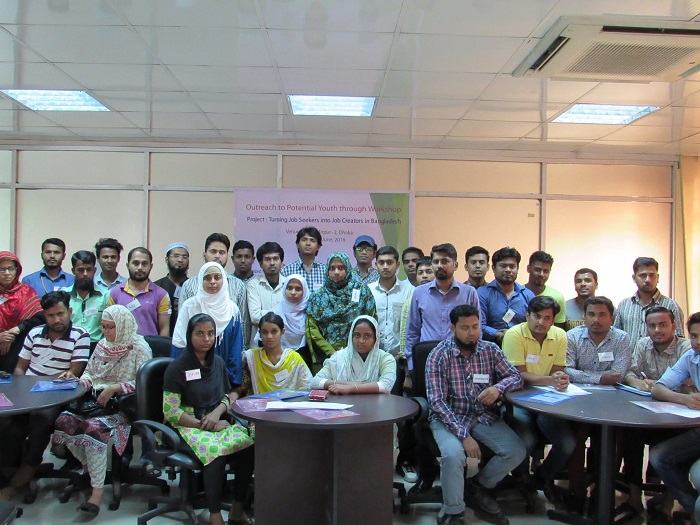Context: The youth unemployment rate in Bangladesh stands at 10.3 per cent, with significant gender differences: 6.2 per cent for men and 22.9 per cent for women. Moreover, 64.3 per cent of young males are employed compared to 14.9 per cent of females. The rate of youth that are neither employed nor in education/training is 41 per cent, with a very high rate of 65.7 per cent for females, and for males a more modest rate of 12.7 per cent. Mismatches between the education system and the labour market mean that unemployment is higher among young persons with tertiary education (26.1 per cent) than among those with lower levels (12.3, 6.4 and 3.2 per cent for those with secondary, primary or less than primary education, respectively). Some 62.1 per cent of employed youth are undereducated for their job, while only 2.9 per cent are deemed overeducated.
Entrepreneurial culture in Bangladesh is not widespread and few young people coming out of education and training opt for self-employment. This problem is compounded by limited access to credit and advisory services for young entrepreneurs seeking to start a new business.
Implementation of programme/ initiative: The Bangladesh Youth Enterprise Advice & Helpcentre (B’YEAH) is an NGO established in 2007 and part of the Youth Business International (YBI) network, founded by HRH The Princes of Wales. B’YEAH also has partnerships with government agencies and companies in Bangladesh.
B’YEAH’s mission is to empower Bangladeshi youth, especially women and under-served youth, through increasing self-employment, decreasing youth unemployment and facilitating the growth of small and medium-sized enterprises that meet the criteria of sustainable development. B’YEAH aims at turning job seekers into job creators. It assists young entrepreneurs that are unable to find support elsewhere with viable business ideas and a combination of access to capital (collateral-free loans), volunteer mentoring and training, and other business development services. Mentors, usually experienced local businesspeople, guide the young candidates one-on-one or as a group during the first three critical years of their business activities.
B’YEAH’s work is supported by grants from several organizations, inter alia, Canadian CIDA, British Asian Fund and Plan International. As part of The Queen Elisabeth’s Commonwealth Young Leaders Programme, Comic Relief has awarded B’YEAH with a grant of GBP479,107 for the period 2015-2020.
Main challenges:Most applications received have been for the development of businesses focused on tailoring and boutiques. B’YEAH seeks to diversify its entrepreneurial pool and now targets its marketing to encourage applications from other sectors such as catering, organic food and beverages, and small engineering.
As a relatively new organization, B’YEAH has limited financial and human capital resources. Undertaking due diligence to start a new business and approving and disbursing loans also involves significant bureaucratic challenges and requires B’YEAH to invest a great deal of time and labour. Another challenge referred to by B’YEAH is the lack or in-depth mentorship experienced by some volunteers.
Results achieved: B’YEAH’s results (on the creation of new entrepreneurs) and processes (financial budget and key performance indicators) are evaluated tri-monthly by YBI and regularly by donors and the NGO Affairs Bureau. B’YEAH has contributed to the establishment of at least 15 new businesses that have, in turn, created employment for over 500 people (93 per cent of them women). B’YEAH has empowered these young entrepreneurs to take control of their lives and become leaders and role models in their own communities.
Because of child marriage and marriage to older men, many widows in Bangladesh remain young and find themselves impoverished upon the death of their husband. B’YEAH has targeted young widows. Among B’YEAH success stories is a young widow (Ms Begum) who won the Entrepreneur of the Year 2011 in YBI’s worldwide competition.
Moving Forward:Over the next 10 years, B’YEAH aims to support 1,000 entrepreneurs, all of whom are expected to be running sustainable businesses and providing employment for thousands. B’YEAH will also diversify the business sectors in its portfolio, as indicated above, by including new initiatives in sectors like small engineering, with particular attention to servicing mobile sets, air conditioners and other electrical appliances.
The success of several B’YEAH projects has increased the visibility of the organization and helped to secure funding, like the recent grant from Comic Relief/Queen Elisabeth’s Commonwealth Young Leaders Programme, for future work.
Replicability: The Y’BEAH model of providing access to capital and free mentoring to under-served youth has been built on the success of similar initiatives by other organizations within the YBI network. In turn, B’YEAH has had elements of its model replicated by both older and newer YBI members. Organizations in the YBI network need to undergo accreditation to ensure the implementation of a uniform approach to promoting youth self-employment while also adapting it to the local context of each country. One area where B’YEAH has been particularly successful is in the recruitment of women into the programme, an emphasis that has inspired other YBI-associated organizations. Open sharing of good practices and lessons learned has also been of great use to other organizations that seek to implement a similar approach within the YBI network and beyond.
B’YEAH official website: http://www.byeah.org/
Background Information on Bangladesh school-to-work transition. Bangladesh School-to-work Transition 2013 Survey (2016). Bangladesh Bureau of Statistics and International Labor Organization (ILO). http://www.ilo.org/wcmsp5/groups/public/—ed_emp/documents/publication/wcms_537748.pdf
B’YEAH website as member of Youth Business International. http://www. youthbusiness.org/where-we-work/bangladesh/
Acknowledgments:
This good practice was kindly prepared by Dr. Antonio Postigo
Project Details
Date: January 24, 2017
